Related Research Articles

Mark Fredrick Farner is an American musician. He was the original singer and guitarist of the rock band Grand Funk Railroad, which he co-founded in 1969, and later as a contemporary Christian musician.

Robert Clark Seger is a retired American singer, songwriter, and musician. As a locally successful Detroit-area artist, he performed and recorded as Bob Seger and the Last Heard and the Bob Seger System throughout the 1960s, breaking through with his first album, Ramblin' Gamblin' Man in 1969. By the early 1970s, he had dropped the 'System' from his recordings and continued to strive for broader success with various other bands. In 1973, he put together the Silver Bullet Band, with a group of Detroit-area musicians, with whom he became most successful on the national level with the album Live Bullet (1976), recorded live with the Silver Bullet Band in 1975 at Cobo Hall in Detroit, Michigan. In 1976, he achieved a national breakout with the studio album Night Moves. On his studio albums, he also worked extensively with the Alabama-based Muscle Shoals Rhythm Section, which appeared on several of Seger's best-selling singles and albums.
Adrenalin was an American rock band from East Detroit, Michigan, United States, best known for their song "Road of the Gypsy," featured in the 1986 film Iron Eagle.

William Sherille Levise Jr., known professionally as Mitch Ryder, is an American rock singer who has recorded more than 25 albums over more than four decades.
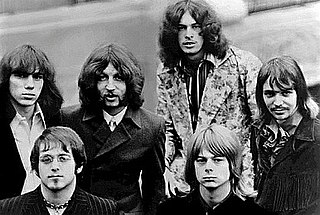
The Amboy Dukes were an American rock band formed in 1964 in Chicago, Illinois, and later based in Detroit, Michigan. They are best known for their only hit single, "Journey to the Center of the Mind". The band's name comes from the title of a novel by Irving Shulman. In the UK, the group's records were released under the name of the American Amboy Dukes, because of the existence of a British group with the same name. The band went through a number of personnel changes during its active years, the only constant being lead guitarist and composer Ted Nugent. The band transitioned to being Nugent's backing band before he discontinued the name in 1975.

Michael John "Cub" Koda was an American rock and roll musician, songwriter, and critic. Rolling Stone magazine considered him best known for writing the song "Smokin' in the Boys Room", recorded by his band Brownsville Station, which reached number 3 on the 1974 Billboard chart.

Jack Scott was a Canadian-American singer and songwriter. He was best known for his string of rockabilly hits in the late 1950s and early 1960s. Scott was inducted into the Michigan Rock and Roll Legends Hall of Fame in 2007 and the Canadian Songwriters Hall of Fame in 2011.
Terry Knight and the Pack was an American garage rock band formed in Flint, Michigan in 1965. The band was signed to the Lucky Eleven label through most of its brief recording career. They produced one national hit with their cover version of the song, "I ". Despite their inability to replicate their success, the band was a frequent attraction in the Michigan rock scene. The Pack was fronted by singer Terry Knight. In 1969 the group disbanded but two members, drummer/vocalist Don Brewer and guitarist Mark Farner, would go on to form another band, Grand Funk Railroad.
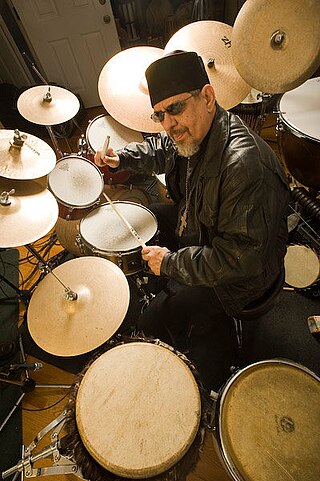
Steven Bookvich known as Muruga Booker is an American drummer, composer, inventor, artist, recording artist, and an autonomous Eastern Orthodox priest.
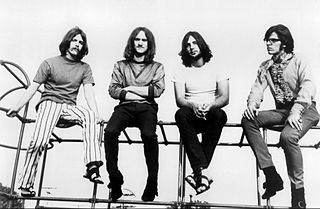
Frijid Pink is an American rock band, formed in Detroit in 1967, best known for their 1969 rendition of "House of the Rising Sun".

Richard Allen Wagner was an American rock guitarist, songwriter and author best known for his work with Alice Cooper, Lou Reed, and Kiss. He also fronted his own Michigan-based bands, the Frost and the Bossmen.
The SRC was a Detroit-based psychedelic rock band from the late 1960s. From 1966 to 1972, they were a staple at many Detroit rock venues, such as the Grande Ballroom.
Dennis James Coffey is an American guitarist. He was a studio musician for many soul and R&B recordings, and is well known for his 1971 Top 10 hit single "Scorpio".

Stephen John Hunter is an American guitarist, primarily a session player. He has worked with Lou Reed and Alice Cooper, acquiring the moniker "The Deacon". Hunter first played with Mitch Ryder's Detroit, beginning a long association with record producer Bob Ezrin who has said Steve Hunter has contributed so much to rock music in general that he truly deserves the designation of "Guitar Hero". Steve Hunter has played some of the greatest riffs in rock history - the first solo in Aerosmith's "Train Kept A Rollin'", the acoustic intro on Peter Gabriel's "Solsbury Hill" and he wrote the intro interlude on Lou Reed's live version of "Sweet Jane" on Reed's first gold record.
The Cherry Slush was an American garage rock band formed in Saginaw, Michigan, in 1965, when the group was known as the Wayfarers and later cut records first as The Bells of Rhymny. They were composed of junior high school students in their 1964–1965 school year, and became a regional success in the Detroit, Michigan music scene. Musically, the band was inspired by The Byrds, who were achieving national success during the period. The group released four singles during their existence, most notably the two regional hits, "She'll Be Back" and "I Cannot Stop You". They were one of the few garage rock bands of the era to have a single chart on the three major listings, Billboard, Cashbox, and Record World.
Pitche Blende was an American garage rock/psychedelic rock band formed in 1967, in Saginaw, Michigan. The group was composed of high school students, mostly from Arthur Hill High School, and became a regional success in the early Michigan Rock culture movement of the late 1960s and early 1970s. The band consisted of six members which included two sisters, vocalist Laurie Seaman and bassist Jinny Seaman, guitarist Dennis Malenfant, rhythm guitarist Dan Quinnan, drummer Mike Volker and singer Tom Morris. Clara Jeanne Seaman, mother of Laurie and Jinny, was the band's manager.
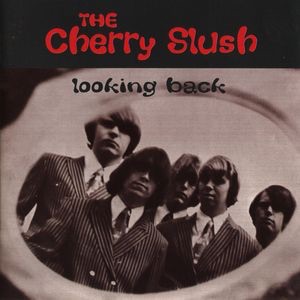
Looking Back is a compilation album by the American garage rock band, the Cherry Slush, and released on WMG Records, in 2001. It was a response to a growing reinterest in the band's music, and extensive bootlegging of their material since their disbandment. The album also saw the former band members cooperating with record producer Dick Wagner, who was a prime factor in the Cherry Slush's regional and brief national success.
Tonto and the Renegades were an American garage rock band from Grand Ledge, Michigan who were active between 1964 and 1969. They were formed by students from Grand Ledge High School and their name derived from the nickname of their bass player, Gary Richey, who because of his Native American heritage was referred to as "Tonto" by his friends at school. The group had several hits in the Southern Michigan region in 1966 and 1967. By the late 1960s group was being courted by major record labels, when the prospect of the Vietnam War draft caused two members to leave the band, resulting in the group's breakup. The intervening years have witnessed a revival of interest in the band's music amongst garage rock enthusiasts. Tonto and the Renegades are now best known for their song "Little Boy Blue", which is today regarded as a garage rock classic. In 2012 Tonto and The Renegades were inducted into the Michigan Rock and Roll Legends online Hall of Fame.
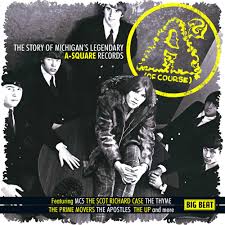
A-Square : The Story of Michigan's Legendary A-Square Records is a collection of garage rock songs originally recorded in the 1960s for the Ann Arbor, Michigan-based A-Square label, which has been compiled for this release by Big Beat Records. Michigan had one of the most active garage rock scenes in the country and Jeep Holland was one of its prime movers, as the owner of one of the city's most premier record stores and founder/proprietor of the A-squared label. This collection focuses on the pivotal period in the later half of 1960s as garage rock began encompass psychedelic influences and gravitate towards heavier sounds, typified by groups such as MC5, two of whose pre-Elektra songs are showcased here. All of the tracks are taken off of source tapes from A-Square's vaults. Noted rock journalist Alec Palao compiled the set and wrote its liner notes.
Jem Targal was an American bass guitarist and singer, known best as a member and co-founder of the rock group Third Power.
References
- ↑ "Frost". Michiganrockandrolllegends.com. Retrieved March 26, 2015.
- ↑ Jason Ankeny. "The Frost - Biography". AllMusic . Retrieved March 26, 2015.
- ↑ "Michigan Rock and Roll Legends - FROST". Michiganrockandrolllegends.com.
- 1 2 "Dick Wagner The Official Website". Wagnermusic.com. Retrieved 2010-12-22.
- ↑ "45 Discography for Vanguard Records". Globaldogproductions.info. Global Dog Productions. Retrieved 2010-12-22.
- ↑ "The Frost". Discogs . Retrieved 2019-08-21.
- 1 2 "Frost Vinyl Records and Rare LPs". Vinyl-records.biz. Retrieved 2010-12-22.